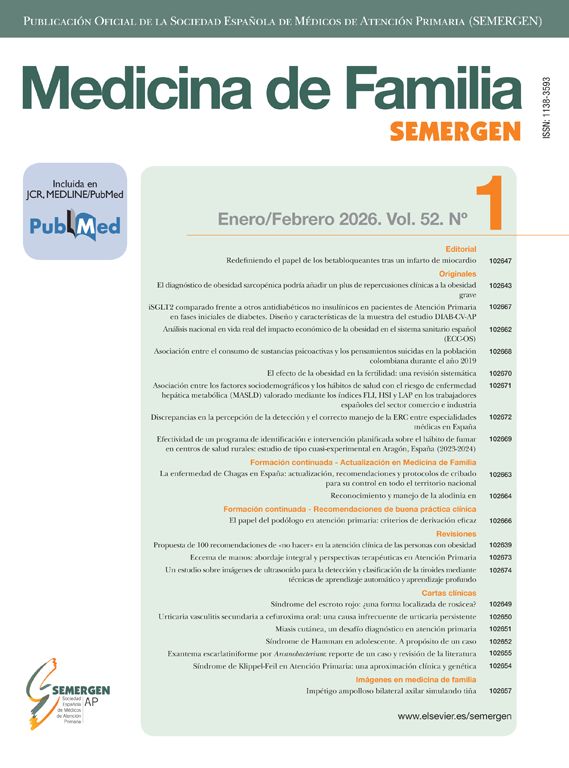El objetivo del estudio fue conocer la opinión del médico de Atención Primaria (AP) ante la obesidad y su motivación para atender a estos pacientes.
Material y métodosEstudio descriptivo transversal. Mil doscientos médicos españoles de AP, muestreo aleatorio estratificado por comunidades autónomas. Encuesta de 63 ítems autocumplimentable, datos sociodemográficos, salud del encuestado, opinión sobre la obesidad, motivación para atender a estos pacientes y tratamiento.
ResultadosSe repartieron 897 encuestas, respondieron 519 (57,9%). Entre estos, el 63,5% eran hombres, grupo de edad entre 45-54 años (61,0%). Un 18,5% fumaban, un 91,7% consumió alcohol y un 45,5% practicaban ejercicio. El 35,5% tenía sobrepeso y el 4,9%, obesidad. De estos, el 15,4% nunca realizó dieta. El 91,9% tenía una percepción buena, muy buena o excelente de su propia salud.
El 90,7% (IC 95%; 88,2-93,2) considera la obesidad una enfermedad y el 71,9% causa de muerte prevenible (64,4% zona norte de España p<0,05). El 58,7% diagnosticó hipertensión o diabetes antes que obesidad. Un 88,3% observó un incremento de la tasa de obesidad entre sus pacientes. El 54,1% (IC 95%; 49,8-58,4) consideraban tener habilidad para motivar al paciente. El 50,1% (IC 95%; 45,8-54,4) prefería trabajar con pacientes con normopeso. Un 61,9% veía al obeso como gran comedor, inactivo y que no hacía caso al consejo médico, el 81,3% creían que el obeso se resiste a cambios del estilo de vida a largo plazo. Un 31,8% cree que los profesionales presentan actitudes negativas hacia estos pacientes (20% en la zona sur-este, p<0,05). Un 52,3% había leído el último año 1-5 artículos sobre obesidad, 34,7% más de seis (44,2% en la zona centro, p<0,05).
ConclusionesEl médico de AP ve la obesidad como una enfermedad y primera causa de mortalidad prevenible, se siente capaz de motivar al paciente, pero prefiere atender otras patologías. En la zona centro y sur-este del territorio español existe una mayor lectura de artículos y una percepción menos negativa de la obesidad.
The main objective of this study was to know the opinion of primary care physicians (AP) toward obesity and their motivation to attend to these patients.
Material and methodsThis was a cross-sectional study that included 1200 Spanish primary care physicians, obtained by stratified random sampling by the Autonomous Communities. Data were obtained regarding a 63 self-administered item survey, sociodemographic aspects, health survey, opinion on obesity, motivation to care for these patients and treatment.
ResultsA total of 897 surveys were distributed, obtaining 519 responses (57.9%). Among these, 63.5% were men, with an age group 45-54 years (61.0%), 18.5% smoked, 91.7% consumed alcohol, 45.5% practiced exercise, 35.5% were overweight and 4.9% obese. A total of 15.4% had never gone on a diet and 91.9% had a good, very good or excellent perception of their own health.
It was found that 90.7% (95% CI; 88.2-93.2) consider obesity as a disease and 71.9% consider that it is a preventable case if death (64.4% north zone of Spain p < 0.05). Hypertension or diabetes, had been diagnosed in 58.7% rather than obesity and 88.3% observed an increase in the rate of obesity among their patients. A total of 54.1% (95% CI; 49.8-58.4) believed that they have ability to motivate the patient, but 50.1% (95% CI; 45.8-54.4) would rather work with normal weight patients. The obese patients are considered to be overeaters, inactive and those who do not follow medical advice by 61.9% and 81.3% believe that obese patients are resistant to long-term lifestyle change. A total of 31.8% believe that the professionals have negative attitudes towards these patients (20% south-east, p<0.05); 52.3% have read 5 articles on obesity, 34.7% more than six (44.2% in the center zone, p<0.05) in the last year.
ConclusionsThe primary care physicians consider obesity as a disease and cause of preventable death. They are confident in their skills to motivate patients to make a lifestyle change, but prefer to attend to other diseases. In the central and south-east areas of Spanish, the primary care physicians read more articles about obesity and have less negative perceptions about obesity.
La agencia que apoyó esta investigación no ha participado en la interpretación de los datos ni en la decisión de enviar este artículo para su publicación.






